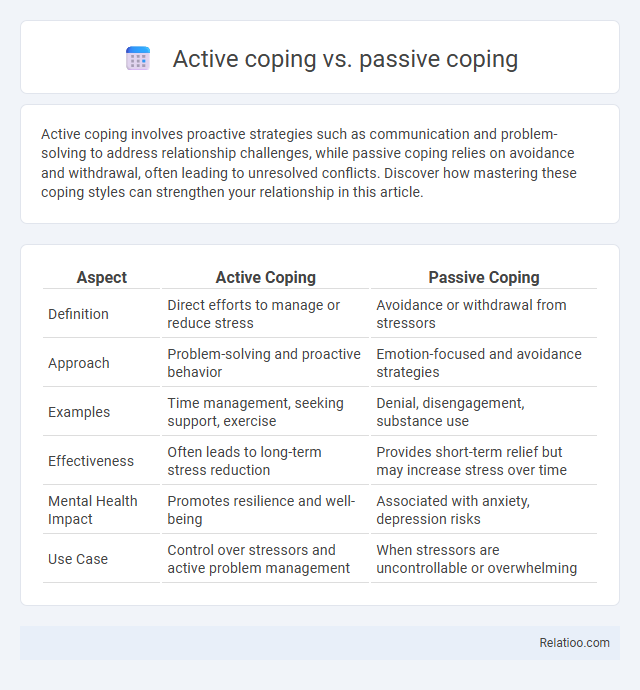Active coping involves proactive strategies such as communication and problem-solving to address relationship challenges, while passive coping relies on avoidance and withdrawal, often leading to unresolved conflicts. Discover how mastering these coping styles can strengthen your relationship in this article.
Table of Comparison
| Aspect | Active Coping | Passive Coping |
|---|---|---|
| Definition | Direct efforts to manage or reduce stress | Avoidance or withdrawal from stressors |
| Approach | Problem-solving and proactive behavior | Emotion-focused and avoidance strategies |
| Examples | Time management, seeking support, exercise | Denial, disengagement, substance use |
| Effectiveness | Often leads to long-term stress reduction | Provides short-term relief but may increase stress over time |
| Mental Health Impact | Promotes resilience and well-being | Associated with anxiety, depression risks |
| Use Case | Control over stressors and active problem management | When stressors are uncontrollable or overwhelming |
Understanding Coping Mechanisms
Understanding coping mechanisms involves distinguishing between active coping, which requires deliberate efforts to address stressors and solve problems, and passive coping, characterized by avoidance or denial that may provide short-term relief but hinder long-term resolution. Active coping strategies, such as problem-solving, seeking social support, or cognitive restructuring, have been linked to better psychological outcomes and resilience. Your ability to recognize and develop active coping skills enhances emotional regulation and overall mental health.
What Is Active Coping?
Active coping involves taking deliberate actions to address stressors by seeking solutions, managing emotions, and controlling the situation. This method empowers you to directly influence challenges, promoting resilience and psychological well-being. Compared to passive coping, which relies on avoidance or denial, active coping encourages proactive behavior for effective stress management.
What Is Passive Coping?
Passive coping involves avoiding dealing directly with stressors and often relying on denial, withdrawal, or distraction instead of taking action to resolve the issue. Unlike active coping, which emphasizes problem-solving and proactive behaviors, passive coping can lead to increased stress and negative emotional outcomes. Understanding how passive coping affects your mental health can help you shift toward more effective strategies for managing stress.
Key Differences Between Active and Passive Coping
Active coping involves directly addressing stressors through problem-solving or seeking support, resulting in proactive management of challenges. Passive coping, conversely, relies on avoidance, denial, or disengagement, which may temporarily reduce stress but often prolongs or exacerbates issues. Understanding these differences helps you adopt more effective coping strategies to enhance resilience and mental well-being.
Psychological Effects of Active Coping
Active coping involves proactive strategies to manage stress by directly addressing challenges, which enhances psychological resilience and reduces symptoms of anxiety and depression. Unlike passive coping, which often entails avoidance or denial and is linked to increased psychological distress, active coping promotes emotional regulation and problem-solving skills. Studies indicate that individuals employing active coping experience improved mental health outcomes and greater overall well-being.
Psychological Effects of Passive Coping
Passive coping often leads to increased psychological distress, such as heightened anxiety and depression, due to avoidance and lack of direct problem-solving. Unlike active coping, which empowers individuals to confront stressors and foster resilience, passive coping may exacerbate feelings of helplessness and reduce emotional regulation capacity. Research indicates that reliance on passive coping mechanisms correlates with poorer mental health outcomes and lower overall psychological well-being.
Benefits of Active Coping Strategies
Active coping strategies directly address stressors by engaging problem-solving techniques and seeking social support, promoting emotional resilience and faster recovery. Your use of active coping enhances mental health by reducing anxiety and depression symptoms compared to passive coping, which often involves avoidance and rumination. Adopting active coping mechanisms leads to improved overall well-being, better stress management, and increased self-efficacy.
Risks Associated With Passive Coping
Passive coping strategies, characterized by avoidance, denial, or withdrawal, are linked to increased risks of prolonged stress and adverse mental health outcomes such as anxiety and depression. Unlike active coping, which involves problem-solving and seeking social support, passive coping often leads to emotional suppression and reduced resilience. Research indicates that individuals relying heavily on passive coping exhibit higher vulnerability to chronic stress-related diseases and diminished overall psychological well-being.
How to Shift From Passive to Active Coping
Shifting from passive to active coping involves developing problem-solving skills and adopting a proactive mindset to manage stressors directly rather than avoiding them. Techniques such as cognitive restructuring, goal-setting, and seeking social support empower individuals to take control of challenging situations, promoting resilience and emotional regulation. Consistent practice and mindfulness can reinforce active coping behaviors, reducing reliance on avoidance and fostering adaptive stress management.
Choosing the Best Coping Strategy for Stress Management
Active coping involves taking deliberate actions to address and reduce stressors, while passive coping typically includes avoidance or denial, which may temporarily alleviate stress but often worsens it over time. Effective stress management depends on your ability to evaluate the situation and choose strategies that promote problem-solving, emotional regulation, and resilience, such as seeking social support or practicing mindfulness. Research shows that active coping generally leads to better psychological outcomes and long-term well-being compared to passive coping methods.

Infographic: Active coping vs Passive coping
 relatioo.com
relatioo.com